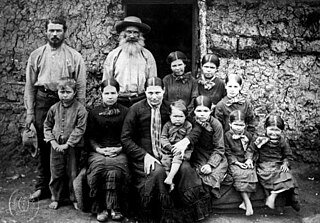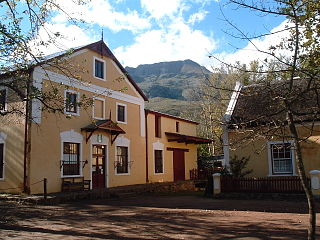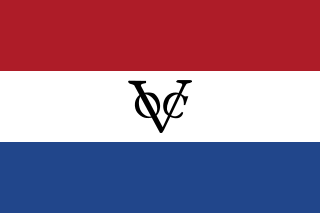Related Research Articles

Boers refers to the descendants of the proto-Afrikaans-speaking Free Burghers of the eastern Cape frontier in Southern Africa during the 17th, 18th, and 19th centuries. From 1652 to 1795, the Dutch East India Company controlled this area, but the United Kingdom incorporated it into the British Empire in 1806. The name of the group is derived from the Dutch and Afrikaans word for 'farmer', whence the former the word 'boor' originates as an anglicization.

The Cape Colony, also known as the Cape of Good Hope, was a British colony in present-day South Africa named after the Cape of Good Hope. The British colony was preceded by an earlier Corporate colony that became a Dutch colony of the same name, the Dutch Cape Colony, established in 1652 by the Dutch East India Company (VOC). The Cape was under VOC rule from 1652 to 1795 and under rule of the Napoleonic Batavia Republic from 1803 to 1806.
The written history of the Cape Colony in what is now South Africa began when Portuguese navigator Bartolomeu Dias became the first modern European to round the Cape of Good Hope in 1488. In 1497, Vasco da Gama sailed along the whole coast of South Africa on his way to India, landed at St Helena Bay for 8 days, and made a detailed description of the area. The Portuguese, attracted by the riches of Asia, made no permanent settlement at the Cape Colony. However, the Dutch East India Company (VOC) settled the area as a location where vessels could restock water and provisions.

The Great Trek, starting in 1836 in southern Africa, was a mass migration of Dutch-speaking inhabitants of the British-run Cape Colony, who left the Cape and travelled eastward by wagon train, into the interior of the continent, in order to live beyond the reach of the British colonial administration. Both the Cape Colony and the area newly colonised by the migrants later became part of what is today the country of South Africa. The Great Trek was spurred by rising tensions between rural descendants of the Cape's original, mostly Dutch, European colonists, known collectively as Boers, and the later, mostly British, colonists, who had taken control of the Cape on behalf of the British Empire. It was also spurred by an increasing yearning among members of the various Boer communities to live in a more isolationist, semi-nomadic way than had become possible in Cape Town, which was becoming much more administratively complex under British management. Boers who took part in the Great Trek identified themselves as voortrekkers, meaning pioneers or pathfinders in Dutch and Afrikaans.
The following lists events that happened during the 1790s in South Africa.
The following lists events that happened during the 1780s in South Africa.
The following lists events that happened during the 1740s in South Africa.
The following lists events that happened during the 1720s in South Africa.
Jan van Riebeeck landed at the Cape on 6 April 1652, setting up a supply station and fortifications for the Dutch East India Company. The decade saw the beginning of European settlement, marked by the introduction of crops from Europe and the New World and culminating in war with the Khoikhoi in 1659.
The following lists events that happened during the 1660s in South Africa.
The following lists events that happened during the 1680s in South Africa.

Simon van der Stel was the last commander and first Governor of the Dutch Cape Colony, the settlement at the Cape of Good Hope.

Genadendal[χəˈnɑːdəndal] is a town in the Western Cape province of South Africa, built on the site of the oldest mission station in the country. It was originally known as Baviaanskloof, but was renamed Genadendal in 1806. Genadendal was the place of the first Teachers' Training College in South Africa, founded in 1838.

Willem Adriaan van der Stel was an Extraordinary Councillor of the Dutch East Indies, and Governor of the Cape Colony, a way station for the Dutch East India Company (VOC), from 23 January 1699 to 1707. He was dismissed after a revolt and was exiled to the Netherlands.

The Great Brak River is a river in the Western Cape, South Africa. The mouth of the river lies at the town of Great Brak River which falls under the Mossel Bay Municipality. The nearest towns are Mossel Bay, 24 km to the west, and the largest town in the southern Cape George, 34 km to the east by road.

The Cape Colony was a Dutch United East India Company (VOC) Colony in Southern Africa, centered on the Cape of Good Hope, from where it derived its name. The original colony and its successive states that the colony was incorporated into occupied much of modern South Africa. Between 1652 and 1691 a Commandment, and between 1691 and 1795 a Governorate of the United East India Company (VOC). Jan van Riebeeck established the colony as a re-supply and layover port for vessels of the VOC trading with Asia. The Cape came under VOC rule from 1652 to 1795 and again from 1803 to 1806. Much to the dismay of the shareholders of the VOC, who focused primarily on making profits from the Asian trade, the colony rapidly expanded into a Settler Colony in the years after its founding.
Hieronymous Cruse was a soldier and explorer for the Dutch East India Company in South Africa.

Johan Bax van Herenthals, also written as Joan Bax, and van Herentals, was born in 's-Hertogenbosch and was the governor of the Dutch Cape Colony from 1676 succeeding the acting interim governor IJsbrand Godske. Agriculture developed during his term and he is recognized as contributing to the development of Botany and Ethnobiology. He declared two wars with the Khoikhoi. He died in Cape Town.
Adriaan van Kervel was governor of the Dutch Cape Colony from 31 August 1737 to 19 September 1737. After only three weeks of serving as Governor he died and Daniël van den Henghel was appointed in an acting capacity.
Jan de la Fontaine was governor of the Cape from 1729 to 1737, after also acting as governor in 1724 to 1727.
References
See Years in South Africa for list of References